Mitigating Risk Factors for Christian International School Students
Tanya crossman and lauren mccall
When TCK Training released our white paper, Caution and Hope: The Prevalence of Adverse Childhood Experiences in Globally Mobile Third Culture Kids, we were only beginning to scratch the surface of the data we collected from 1,904 individuals who completed our 2021 survey on childhood trauma in globally mobile Third Culture Kids. In our second white paper, TCKs at Risk: Risk Factors and Risk Mitigation for Globally Mobile Families, we looked at 12 risk factors and ways to mitigate these risks. This article is part of a series of blog posts that looks a little deeper at certain sub-groups represented in the data.
Mitigating Risk Factors for Christian International School Students
In the course of our research into Adverse Childhood Experiences among globally mobile young people, we learned a lot of difficult truths about what students at Christian international schools experienced. This blog post will discuss the prevalence of various types of abuse and neglect, but includes no graphic descriptions.
According to our research, TCKs who were primarily educated in Christian international schools were four times more likely than Americans to experience emotional abuse. Our survey also found that 1 in 5 Christian international school TCKs experienced sexual abuse, and 40% born after 1980 reported that and adult living in their childhood home with a mental illness.
According to our research, TCKs who were primarily educated in Christian international schools were four times more likely than Americans to experience emotional abuse. Our survey also found that 1 in 5 Christian international school TCKs experienced sexual abuse, and 40% born after 1980 reported that and adult living in their childhood home with a mental illness.
Internationally mobile families and children are often viewed as privileged, and therefore not at risk of ACEs, PTSD, or other mental health struggles. This data suggests the opposite.
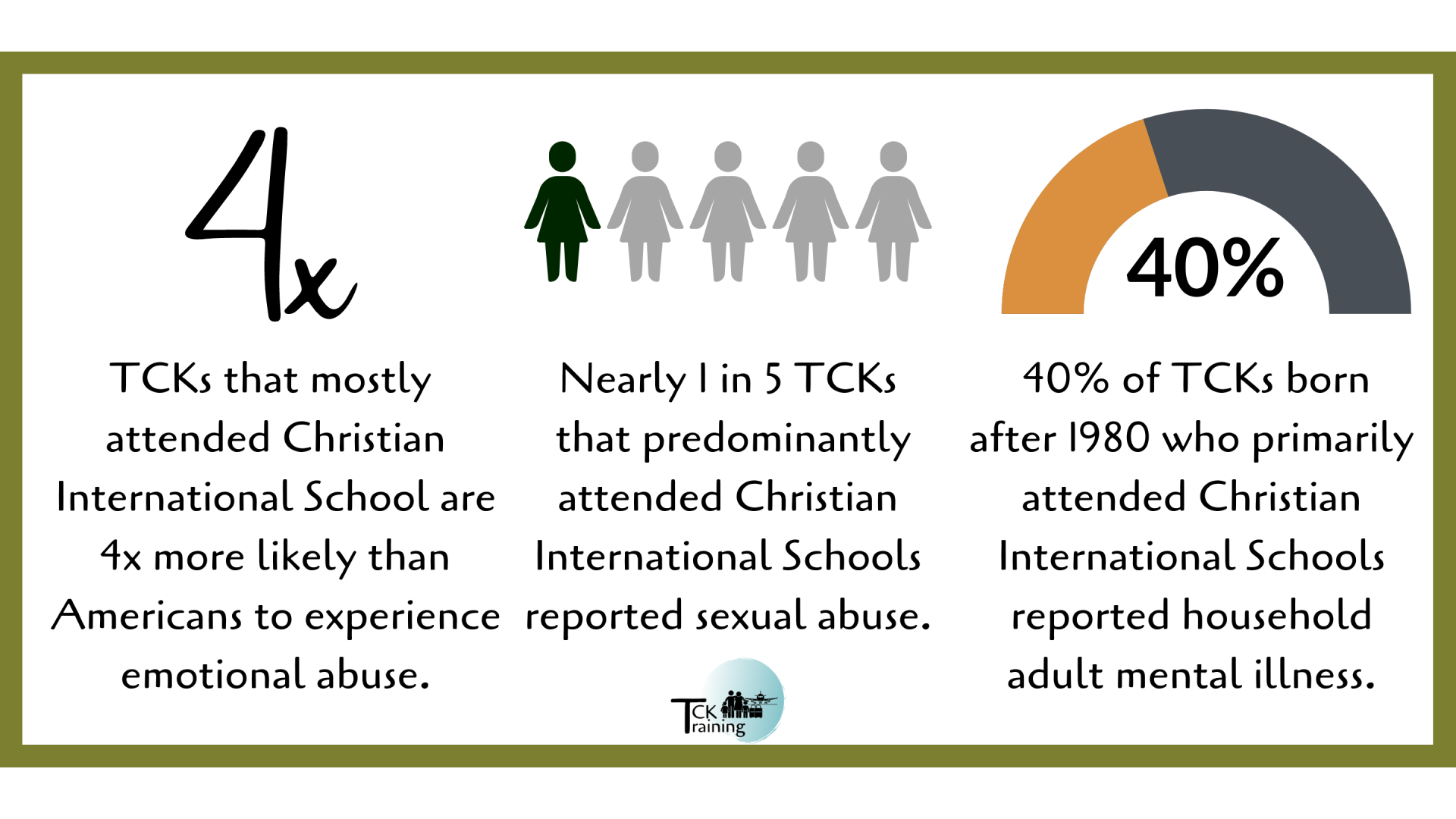
Among the demographic factors we collected were the primary reason the family moved internationally, and their core educational experience. The education types were: local/national school, international school (including Department of Defence schools), Christian international school (including missionary schools), boarding school, and homeschool (including co-ops and online schooling). We found a strong correlation between sector and education:
The majority of those who attended Christian international schools self-identified as missionary kids (MKs). For this reason, it is helpful to compare the statistics of Christian international school students not just to TCKs generally, but also to MKs specifically…When the percentage of total TCKs is compared to school choice, it also becomes clear that MKs are more likely to choose Christian international schools. MKs made up 56% of TCKs in the sample overall, but 86% of TCKs who attended Christian international schools.
For this reason, we are using two types of charts in this blog post. We compare risk factors in different educational experiences, but also compare the rates seen in Christian international school students to both missionary and non-missionary groups overall.
Adverse Childhood Experiences (ACEs)
Research into ACEs has taken place worldwide across 25 years. The ten ACE factors are divided into Child Maltreatment (abuse and neglect directly suffered as a child) and Household Dysfunction (factors affecting the childhood living environment). The ACE questionnaire asks about childhood experiences without using the words "abuse" or "neglect" - helpful for catching abusive or neglectful experiences a person would not label that way themselves. We often compare our results to the CDC-Kaiser study of 17,000 Americans, as this is the largest ACE study done worldwide to date. Comparisons with other global populations can be found in our white paper.
We saw consistently different results across categories among TCKs born before/after 1980 – with the Boomer/Gen X generations on one side, and the Millennial/Gen Z generations on the other. This also separates the groups who were/were not impacted by the internet during childhood.
Abuse
Abuse is broken down into three categories: physical, emotional, and sexual. (The ACE questionnaire only asks about physical and emotional abuse that occurs within the home.) 1 in 6 (16%) students who primarily attended Christian international school experienced physical abuse at home, while 1 in 5 (21%) experienced sexual abuse, and 2 in 5 (39%) experienced emotional abuse at home. Although this is the lowest rate of emotional abuse among the five education types in our survey, it is still four times the rate found among Americans (11%).
Adverse Childhood Experiences (ACEs)
Research into ACEs has taken place worldwide across 25 years. The ten ACE factors are divided into Child Maltreatment (abuse and neglect directly suffered as a child) and Household Dysfunction (factors affecting the childhood living environment). The ACE questionnaire asks about childhood experiences without using the words "abuse" or "neglect" - helpful for catching abusive or neglectful experiences a person would not label that way themselves. We often compare our results to the CDC-Kaiser study of 17,000 Americans, as this is the largest ACE study done worldwide to date. Comparisons with other global populations can be found in our white paper.
We saw consistently different results across categories among TCKs born before/after 1980 – with the Boomer/Gen X generations on one side, and the Millennial/Gen Z generations on the other. This also separates the groups who were/were not impacted by the internet during childhood.
Abuse
Abuse is broken down into three categories: physical, emotional, and sexual. (The ACE questionnaire only asks about physical and emotional abuse that occurs within the home.) 1 in 6 (16%) students who primarily attended Christian international school experienced physical abuse at home, while 1 in 5 (21%) experienced sexual abuse, and 2 in 5 (39%) experienced emotional abuse at home. Although this is the lowest rate of emotional abuse among the five education types in our survey, it is still four times the rate found among Americans (11%).
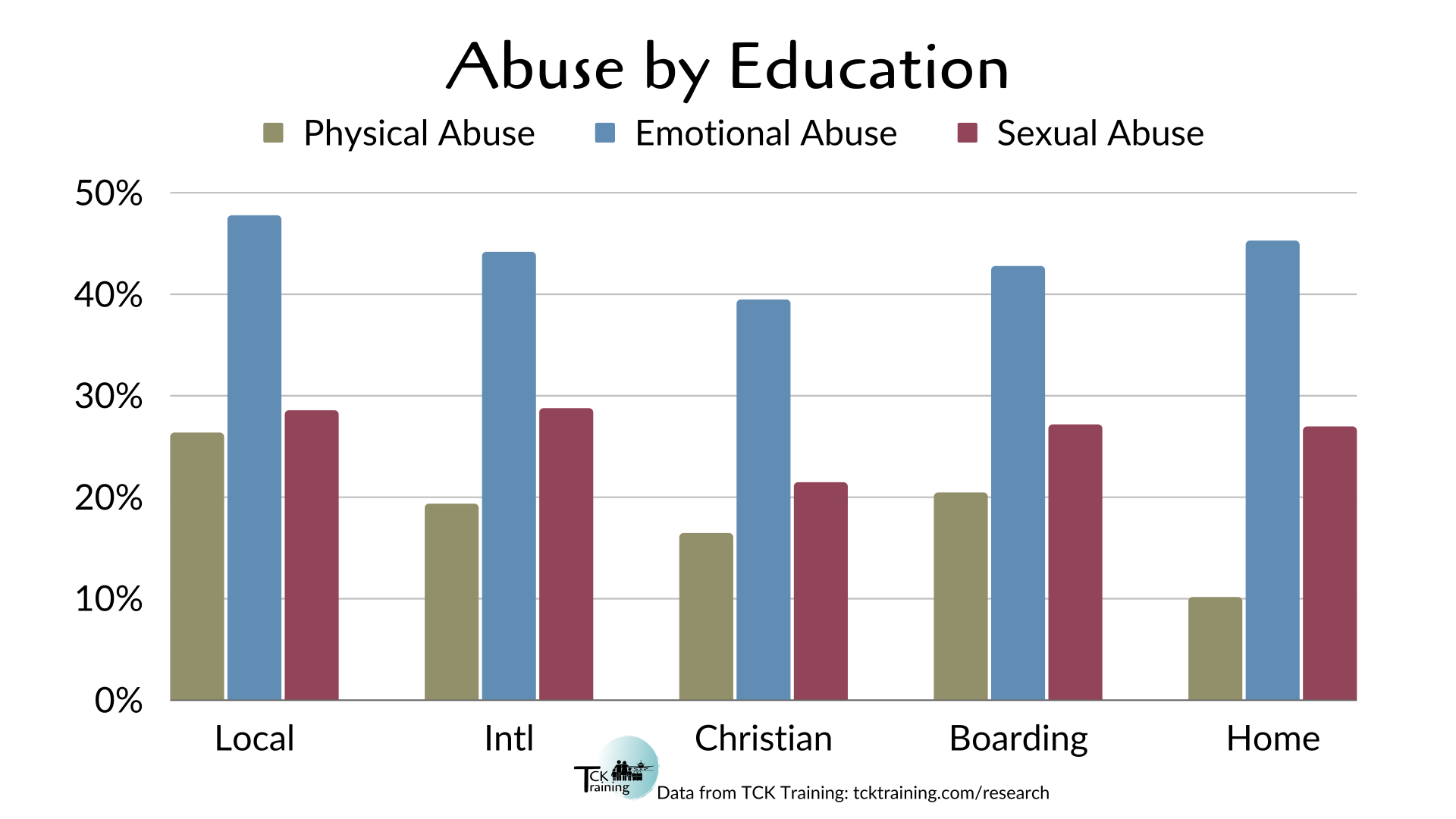
Students in Christian international schools experienced physical and emotional abuse at the same rate as missionary TCKs, while they experienced sexual abuse at a slightly lower rate than missionary TCKs overall (24% vs 21%).
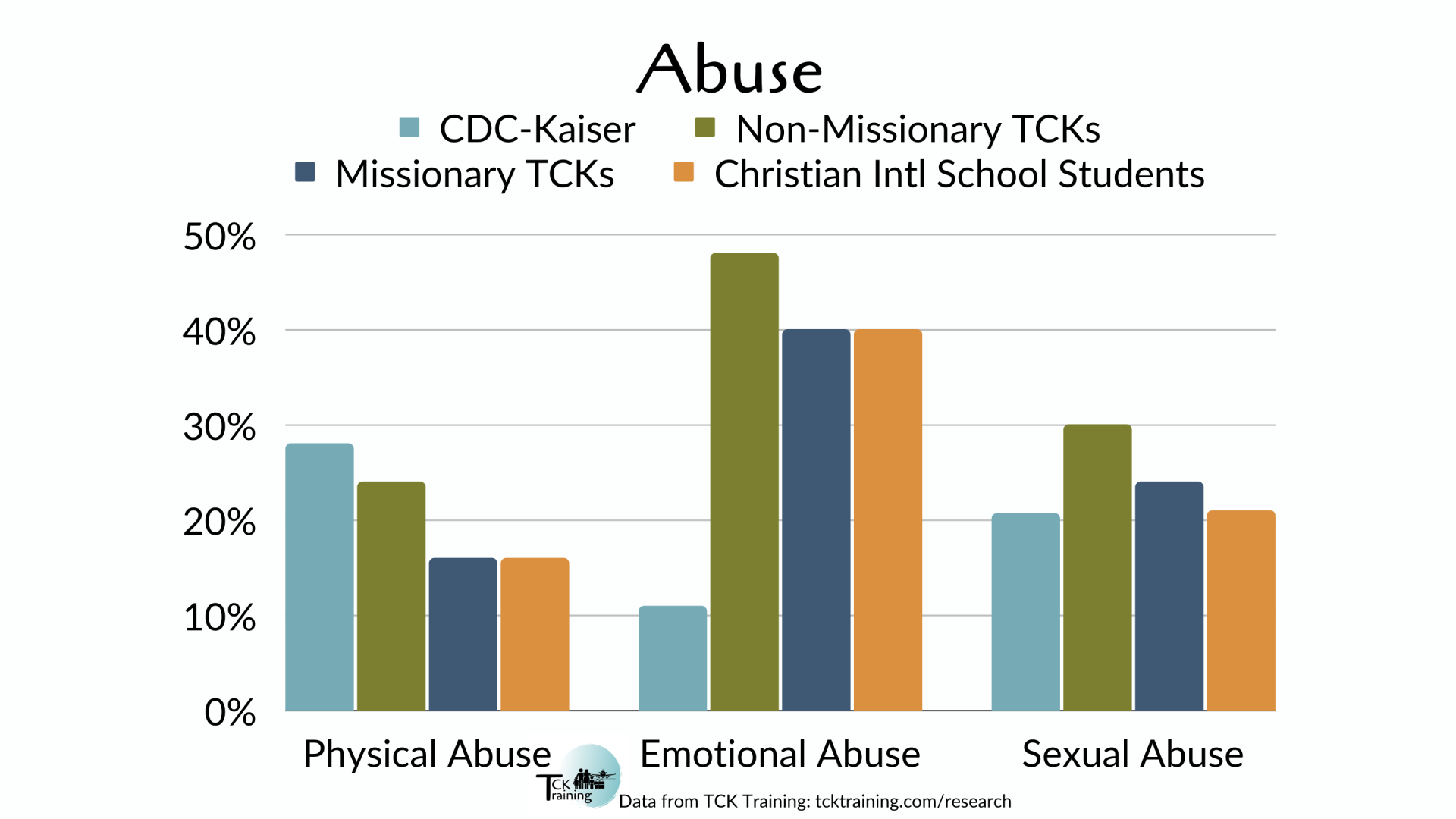
All types of abuse trended downward in younger generations, however the degree at which the trends moved were different. Physical abuse dropped from 20% to 15% and emotional abuse decreased from 48% to 36%. Sexual abuse nearly halved, dropping from 31% of those born before 1980 to 18% in younger generations. While this drop is a wonderful trend, that still leaves nearly 1 in 5 younger TCKs in Christian international schools experiencing sexual abuse before the age of 18.
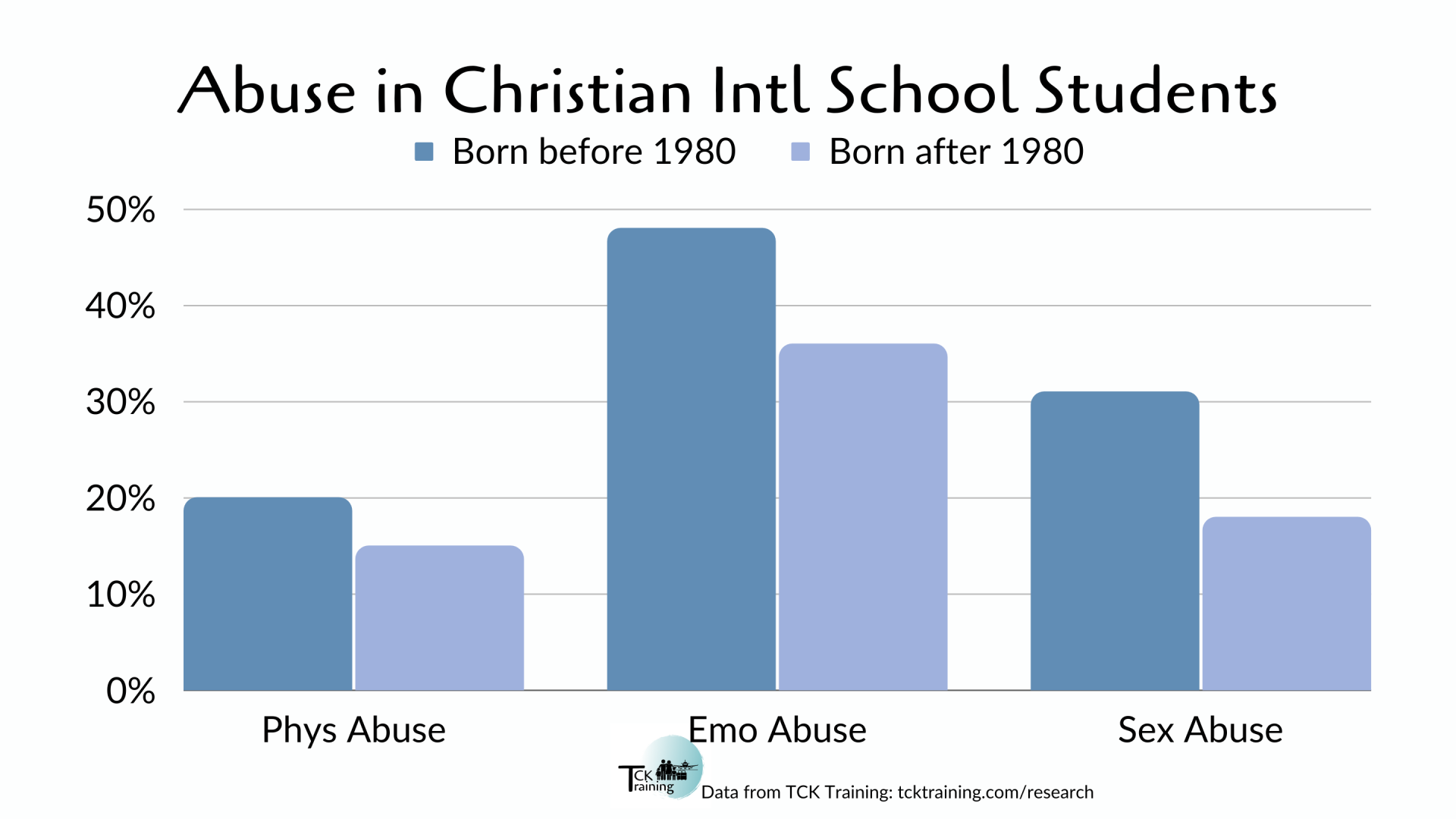
While child-to-child sexual abuse was not included in the original ACE study, it is worth noting due to the lasting effects on survivors. TCKs who reported child-to-child sexual abuse also had higher rates of emotional abuse (65%), adult-to-child sexual abuse (44%), and emotional neglect (54%). Of the surveyed adult TCKs who predominantly went to Christian International schools, 22% reported experiencing child-to-child sexual abuse. Again, while this is a lower rate than seen in other educational types, it still represents more than 1 in 5 students in Christian international schools.
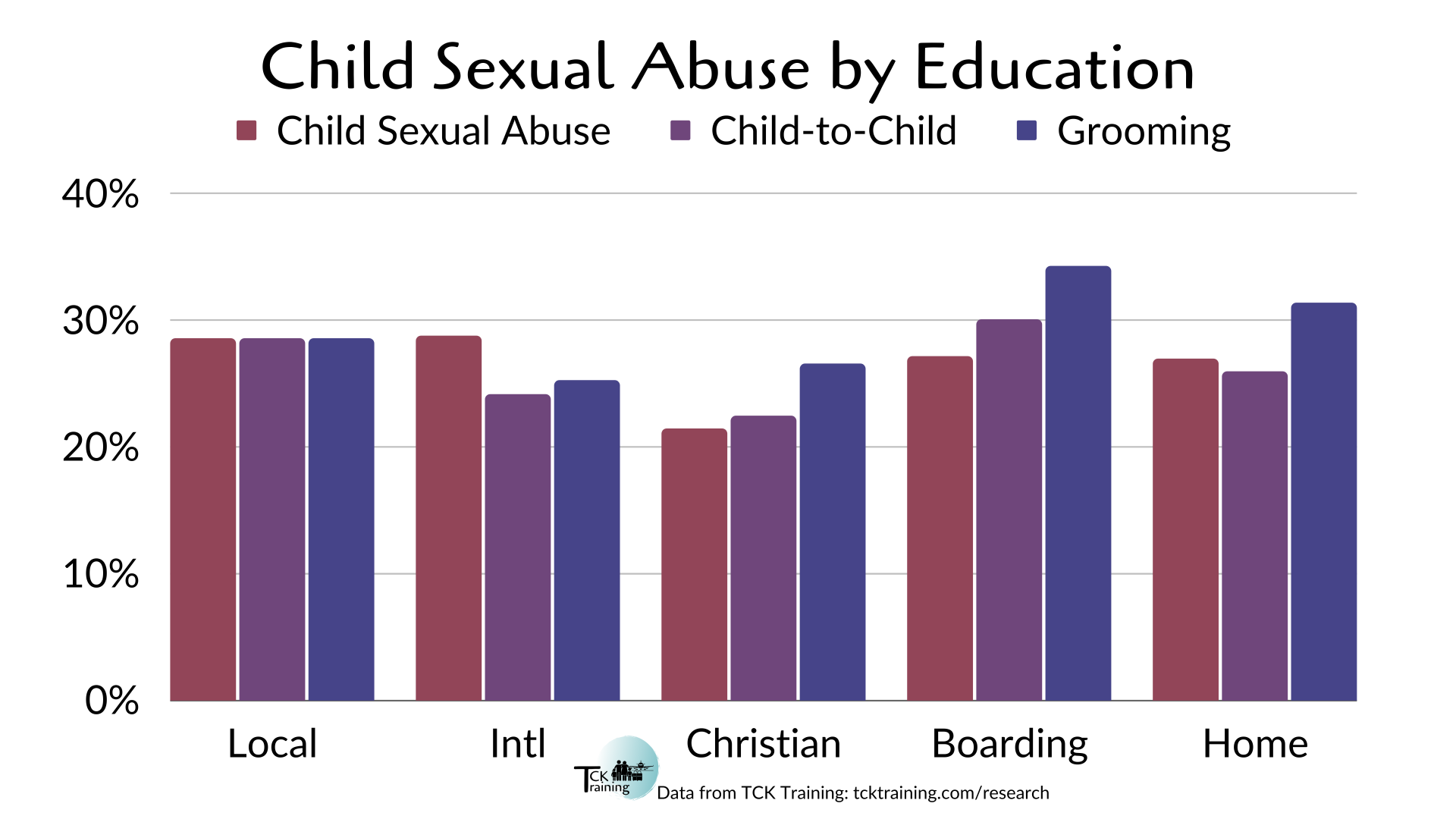
Another risk factor not included in the ACE questionnaire is grooming. 68% of TCKs who reported grooming also reported experiencing child sexual abuse. 26.5% of TCKs who attended Christian international school reported grooming behaviors directed toward them by adults, slightly higher than seen in other international schools. When over one quarter of the student body experiences grooming, this is an issue Christian international schools need to address.
During the review process of our survey, experts connected to the international school world discussed the problem of grooming behavior in school settings and particularly a lack of data concerning the prevalence of this. We added a question on grooming in order to gain data about this important issue, even though it would not add to ACE scores themselves.
Neglect
Neglect is defined through the lens of perception, where a child feels/worries their emotional/physical needs will not be met. While physical neglect is often seen as an extension of poverty, in the ACE context it is not just about what the child has access to but also about their security that provision will continue in the future. In the case of emotional neglect, a child feels unloved or unimportant – whether or not their parents actually do love them. In cases of physical neglect, a child feels their physical needs may not be met – even if they are always fed and cared for. This can look like worry that they will not have enough food, shelter, clean clothing, protection, or medical care.
Neglect is defined through the lens of perception, where a child feels/worries their emotional/physical needs will not be met. While physical neglect is often seen as an extension of poverty, in the ACE context it is not just about what the child has access to but also about their security that provision will continue in the future. In the case of emotional neglect, a child feels unloved or unimportant – whether or not their parents actually do love them. In cases of physical neglect, a child feels their physical needs may not be met – even if they are always fed and cared for. This can look like worry that they will not have enough food, shelter, clean clothing, protection, or medical care.
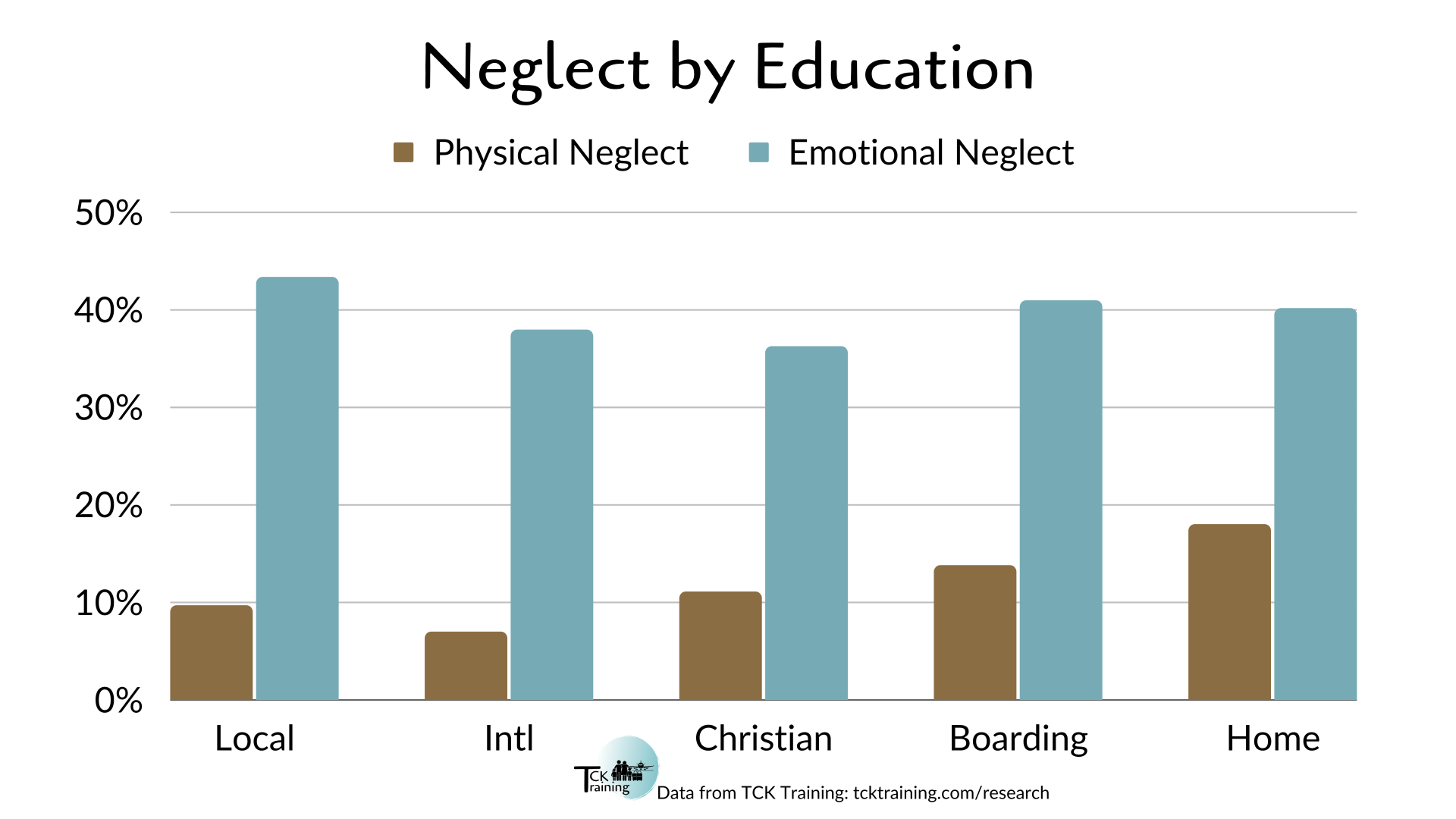
11% of students primarily attending Christian international schools reported physical neglect, similar to the 10% reported by Americans, and lower than the 14% reported by missionary TCKs overall. 1 in 3 (36%) Christian international school students reported emotional neglect, which while lower than seen in other education types is still more than three times the rate found among Americans.
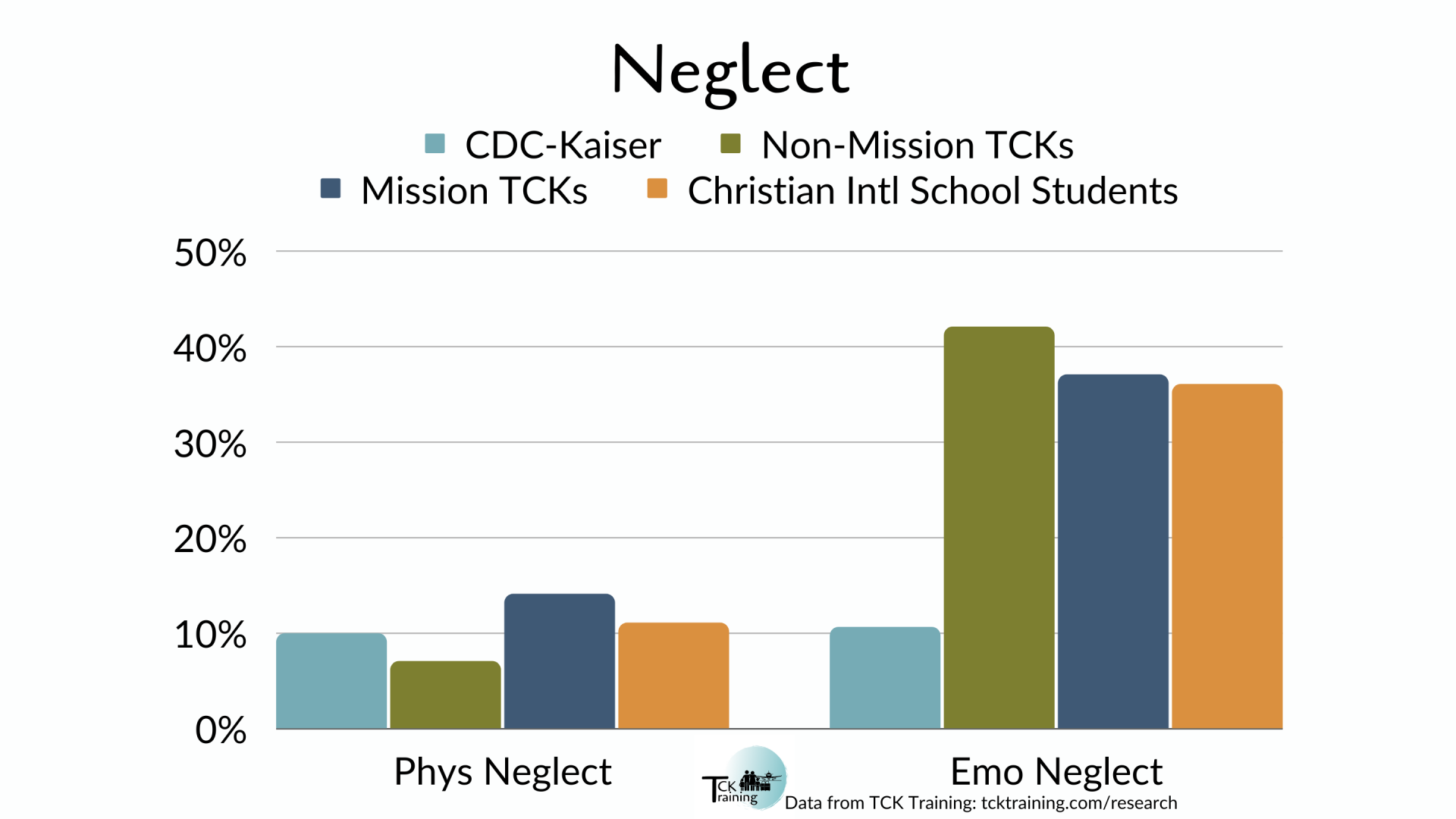
Household Dysfunction
Household dysfunction encompasses household adult mental illness, parental violence, parental divorce or separation, household adult incarceration, and household adult substance abuse. Incarceration was so low among TCKs that we have not included it in this summary.
Household dysfunction encompasses household adult mental illness, parental violence, parental divorce or separation, household adult incarceration, and household adult substance abuse. Incarceration was so low among TCKs that we have not included it in this summary.
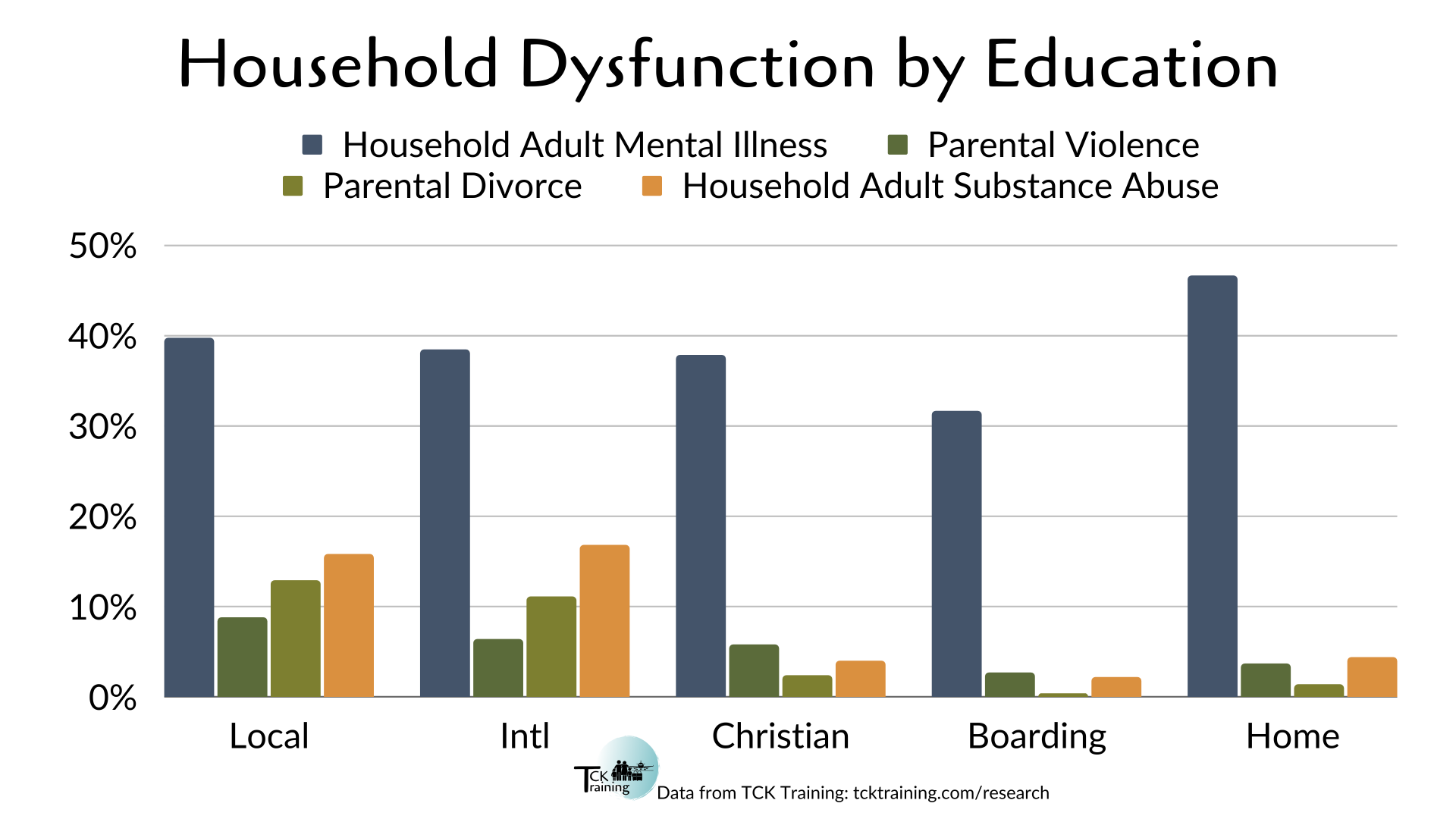
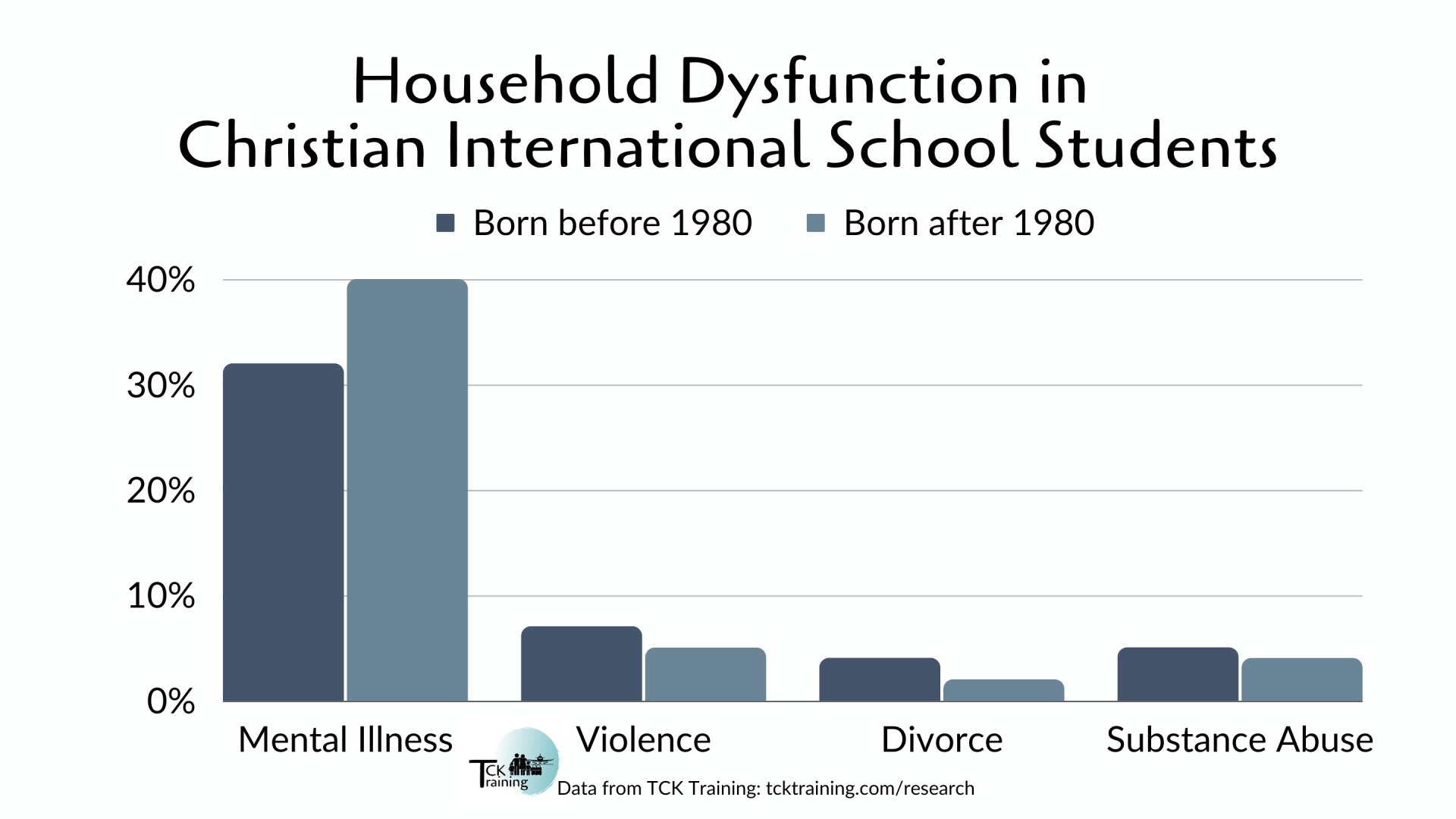
Household Adult Mental Illness
Household adult mental illness is an ACE assigned to anyone who had an adult living in their home during childhood who was depressed, mentally ill, or attempted suicide.The overall rate of household adult mental illness among all TCKs (39%) is similar to that of Christian international students overall (38%); this is twice the rate seen in Americans (19%).
Household adult mental illness is an ACE assigned to anyone who had an adult living in their home during childhood who was depressed, mentally ill, or attempted suicide.The overall rate of household adult mental illness among all TCKs (39%) is similar to that of Christian international students overall (38%); this is twice the rate seen in Americans (19%).
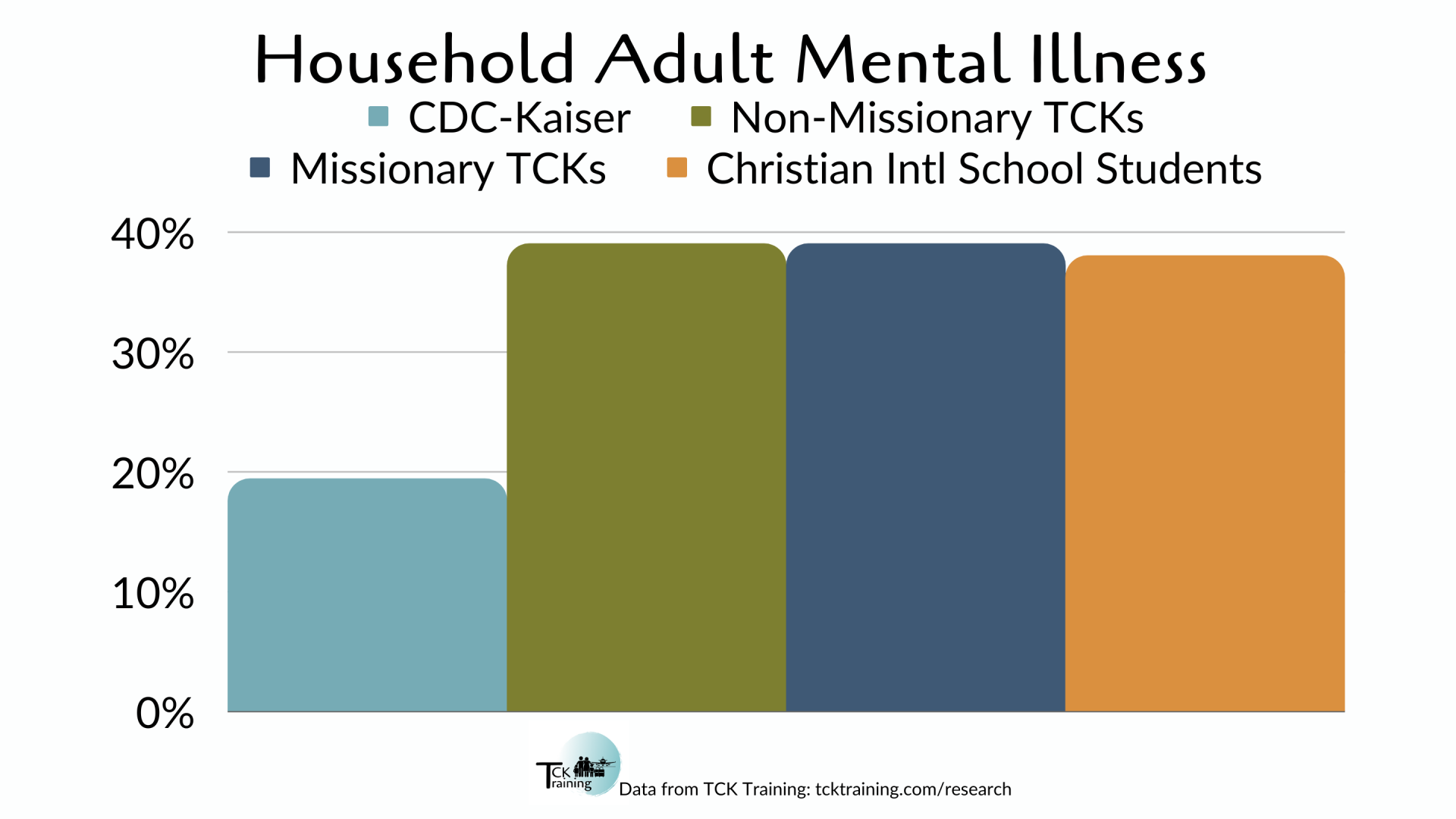
The rate at which mental illness was reported rose over time. Nearly 1 in 3 Boomers and Gen X Christian international school students (32%) reported household adult mental illness, compared to 40% of Millennials and Gen Z. The high rates of household mental illness reported by TCKs in comparison to Americans demonstrates that many expatriate families are under stress, and they need support.
Parents in international communities especially must be empowered to care for their own emotional needs, recognising this as vital for the long-term thriving of their children. Pushing through hurts not only yourself, but also your ability to show up for your children.
Parental Violence
Parental violence is defined as a child being impacted by, even if not actually witnessing, violence toward a mother/step-mother or father/step-father. 6% of Christian international school students reported parental violence. This rate decreased slightly over time, with 5% of younger Christian international school students reporting parental violence. Christian international school students experienced parental violence at less than half of the rate found among Americans, and at a slightly higher rate than missionary TCKs (5%).
Parental violence is defined as a child being impacted by, even if not actually witnessing, violence toward a mother/step-mother or father/step-father. 6% of Christian international school students reported parental violence. This rate decreased slightly over time, with 5% of younger Christian international school students reporting parental violence. Christian international school students experienced parental violence at less than half of the rate found among Americans, and at a slightly higher rate than missionary TCKs (5%).
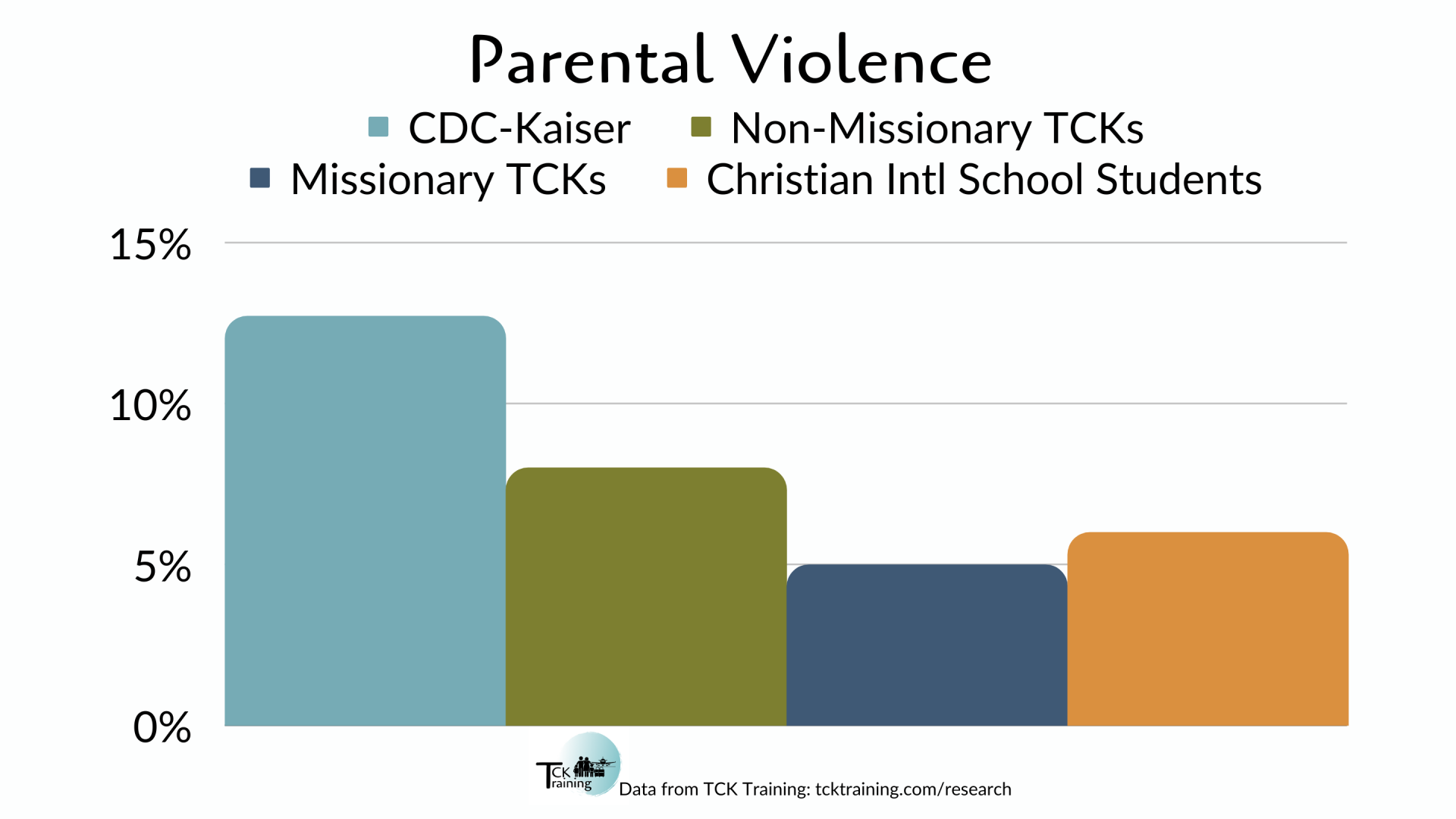
While 6% is a low number, and great to see, that still represents slightly more than 1 in 20 children – suggesting that on average, one student in each Christian international school classroom lives in a family impacted by violence. The support needed can be challenging to find while living abroad, but it is vital to extend services to these families in crisis.
It is vital that everyone who cares for TCKs be educated on what domestic abuse is, how to recognize it, and how to support families and children when domestic abuse is present.
Divorce/Separation
While the rate of parental divorce/separation was 23% in the CDC-Kaiser study, it was much lower among TCKs. 2% of Christian international school students experienced parental divorce/separation before age 18, slightly higher than 1.5% of missionary TCKs overall. There was a decrease in the divorce rate among Christian international school families over time (4% vs. 2%). This said, a lower divorce rate does not necessarily guarantee stronger marriages.
While the rate of parental divorce/separation was 23% in the CDC-Kaiser study, it was much lower among TCKs. 2% of Christian international school students experienced parental divorce/separation before age 18, slightly higher than 1.5% of missionary TCKs overall. There was a decrease in the divorce rate among Christian international school families over time (4% vs. 2%). This said, a lower divorce rate does not necessarily guarantee stronger marriages.
There are factors that make divorced employees less likely to seek or be awarded an overseas assignment. There are also outside factors that make divorce less accessible or less appealing to expats. A divorce is a legal proceeding, and managing this while living a global life is complex, especially when work visas and custody of children is involved.
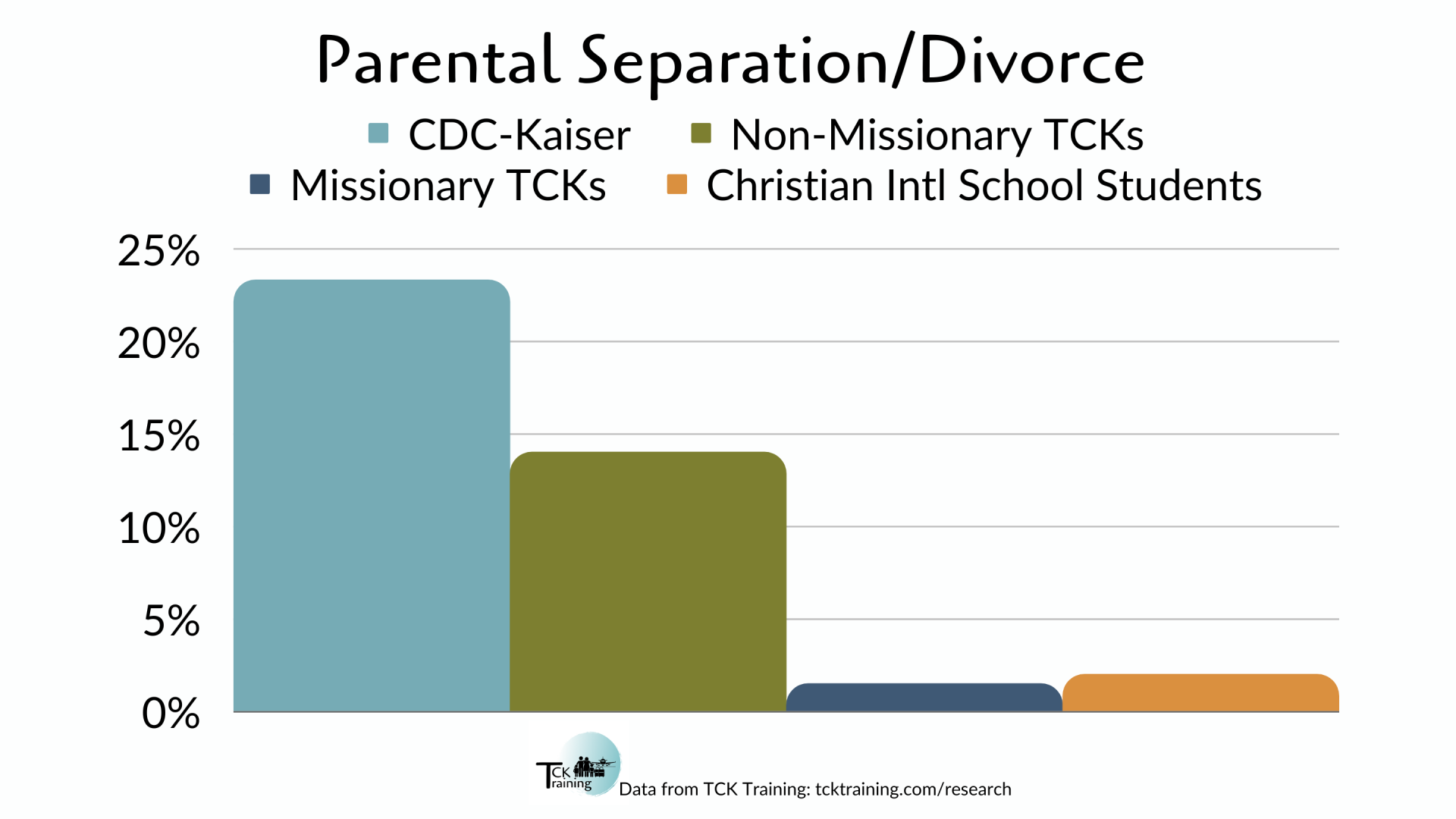
Substance Abuse
Substance abuse as an ACE factor required that an adult living in the home was an alcoholic or used illicit drugs. 4% of Christian international school students reported household adult substance abuse, slightly more than the 3% of missionary TCKs overall. The rate decreased slightly over time, from 5% to 4%. Substance abuse can be another sign of families under stress, in need of care and support.
Substance abuse as an ACE factor required that an adult living in the home was an alcoholic or used illicit drugs. 4% of Christian international school students reported household adult substance abuse, slightly more than the 3% of missionary TCKs overall. The rate decreased slightly over time, from 5% to 4%. Substance abuse can be another sign of families under stress, in need of care and support.
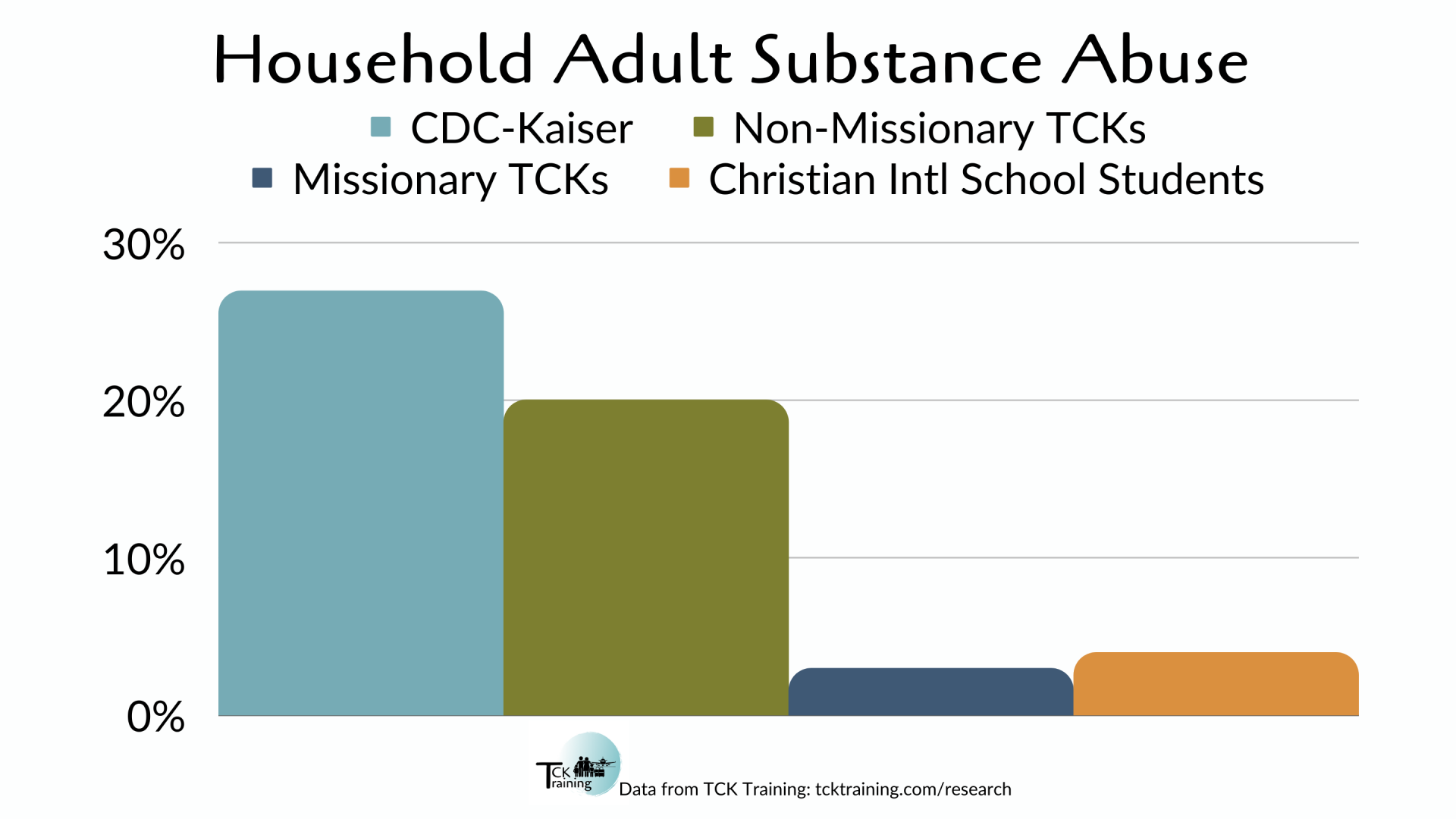
Risk Mitigation
Although this data can seem pretty disheartening, there is hope, including ways to mitigate the risks we’ve talked about. Globally mobile families need support in order to raise thriving children and meet their needs. These challenges and risks are not unsolvable or reasons to despair, but rather reasons to take action in intentional ways that reflect the urgency of the matter.
In TCKs at Risk we outline a number of ways that organizations can protect children and support families. For example, additional research into Positive Childhood Experiences (PCEs) gives a roadmap for effectively buffering children from difficulties they face.
Although this data can seem pretty disheartening, there is hope, including ways to mitigate the risks we’ve talked about. Globally mobile families need support in order to raise thriving children and meet their needs. These challenges and risks are not unsolvable or reasons to despair, but rather reasons to take action in intentional ways that reflect the urgency of the matter.
In TCKs at Risk we outline a number of ways that organizations can protect children and support families. For example, additional research into Positive Childhood Experiences (PCEs) gives a roadmap for effectively buffering children from difficulties they face.
Simple intentionality in parenting, policies, and procedures can mitigate the risk and increase the chances of positive, healthy outcomes for Third Culture Kids… When a person had four or more Adverse Childhood Experiences, also having at least six of these Positive Childhood Experiences lowered the risk for depression in adulthood by 72%.
With 16% of adult TCKs who attended Christian international school reporting 4 or more ACEs, these buffering protections are particularly important. (Source: Caution and Hope for Students in Christian International Schools).
It is valuable for those of us working in the international education field to have access to research grounded in international life. Knowing what our students are statistically likely to face and what interventions are best placed to lower risks and increase resilience is of great benefit. PCEs help develop resilience, and emotional regulation is of particular importance given the ACE factors that are high among TCKs.
Child protection is essential, and school-wide strategies should be put in place to safeguard children. The child protection strategies a school offers is an important factor for parents to research and consider when choosing a school for their children. While child protection laws differ from country to country, many international schools are holding themselves to higher standards than ‘required’ by national law. Accreditation bodies are also beginning to include child protection standards in their requirements.
Robust child safety policies don’t end with hiring or initial onboarding but also include ongoing frequentative trainings in child safety principles for everyone who might encounter children. This training sets up an expectation of how children should be treated, including prevention or ‘above-reproach’ strategies, such as not being alone with a child. These safeguards can help people without intent to harm to succeed in their best intentions, can help people identify suspicious behavior, and can promote healthy vigilance in the protection and safeguarding of children.
Christian international schools are perfectly placed to provide care to globally mobile families. Not all families receive training on transition and parenting internationally pre-departure, or during their international assignment. Furthermore, the practical application of this training is beneficial for all families, globally mobile or otherwise. When Christian international schools take up the opportunity to educate their school community about the risks of international life and how to mitigate these risks, this preventive care improves outcomes for everyone.
International schools who genuinely care about student welfare and long-term thriving for their students will invest in margin/mental health support for their staff, and preventive care resourcing for their parent community.
Whether you are a parent, educator, or school administrator, TCK Training is here to help! We offer a range of training and support, both organization-wide and for individual families. We have a full range of virtual and in-person services for international schools, including our Virtual Training Courses for International School Staff, Sexual Abuse Awareness Training, and Preventing TCK Neglect as an Organization.
We also offer faith-based resources that Christian international schools may find helpful – especially those serving missionary communities: Faith-Based Resources for TCK Care, Discipling Missionary Kids, Biblical Foundations on MK Care, plus our free resource, Biblical Foundations for MK Care Booklet.
Parents seeking direct support can benefit from workshops such as Understanding Emotional Abuse and Neglect as a Parent, Risk Prevention for Highly Mobile Families, and Raising Healthy TCKs.
We also offer faith-based resources that Christian international schools may find helpful – especially those serving missionary communities: Faith-Based Resources for TCK Care, Discipling Missionary Kids, Biblical Foundations on MK Care, plus our free resource, Biblical Foundations for MK Care Booklet.
Parents seeking direct support can benefit from workshops such as Understanding Emotional Abuse and Neglect as a Parent, Risk Prevention for Highly Mobile Families, and Raising Healthy TCKs.
Empty space, drag to resize
Related blog posts:
Caution and Hope for Students in Christian International Schools
Other blog posts in this series:
Caution and Hope for Students in Christian International Schools
Other blog posts in this series:
- Mitigating Risk Factors for International School Students
- Mitigating Risk Factors for Diplomat Kids
- Mitigating Risk Factors for International Business Kids
- Mitigating Risk Factors for Military Kids
- Mitigating Risk Factors for Children of International Educators and Humanitarian Workers
- Mitigating Risk Factors for Mission Kids
About the Authors
Tanya Crossman grew up in Australia and the US before moving to China at age 21; she has worked with TCKs for 20 years. She is the Director of Research and International Education at TCK Training.
Lauren is an adult TCK who grew up in East Africa and has spent nearly 10 years working with TCKs in the U.S. Her experiences have fueled her passion for supporting TCKs through preventative care that fosters healthy, thriving adults. She holds a Master’s in Public Health.



